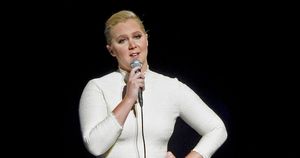Netflix's latest drama series, Apple Cider Vinegar, delves deep through the twisted narrative of Belle Gibson, the Australian wellness influencer whose claims to have cured her brain cancer through natural remedies led to widespread deception and controversy. Starring Kaitlyn Dever as Gibson, the series not only dramatizes her life but also explores the powerful influence such personas can wield over their followers.
Gibson built her reputation under the guise of being a cancer survivor, ironically crafting her wellness empire on outright lies. Though she insisted she was diagnosed with glioblastoma, the truth is she had no cancer diagnosis at all. Her rise included launching The Whole Pantry, a wellness app, which quickly gained traction and was even endorsed by Apple.
According to reports, Gibson had once claimed she would die within months due to her brain cancer, using this narrative to gain immense popularity on various social media platforms. Yet, scrutiny soon began to surround her claims when friends and acquaintances urged her to disclose medical evidence of her alleged illness—evidence she simply could not provide. An article from The Age would serve as the catalyst for her downfall, illuminating her fraud, which included lying about charitable donations meant for cancer patients.
Apple Cider Vinegar also introduces the character of Milla Blake, portrayed by Alycia Debnam-Carey, who is portrayed as Gibson's idol. Unlike Gibson, Milla's storyline is rooted in real-life parallels. The young woman grapples with her own cancer diagnosis of soft tissue sarcoma, which prompts her to seek alternative treatments over traditional care recommended by healthcare professionals. Milla's struggles and choices reflect the dangerous allure of the holistic wellness movement, mirroring the experience of the late Jessica Ainscough, another figure emblematic of this trend.
Though Milla is not based on Ainscough directly, her character seems to amalgamate elements from Ainscough’s life. Ainscough became known as the 'Wellness Warrior' and shared her own battle with cancer on social media. Similar to Milla's narrative, Ainscough resisted mainstream medical advice, opting instead for the controversial Gerson therapy, which has no proven efficacy against cancer.
Underneath the glamor of wellness influencers lies disturbing narratives too. The show presents Milla as someone whose life, much like Ainscough's, spiraled tragically. Ainscough’s mother, who also succumbed to breast cancer, began following her daughter's alternative approach, culminating tragically. Milla's eventual downfall, driven by denial and the embrace of unwarranted treatment methods, serves as a cautionary tale about the perils of misinformation.
Samantha Strauss, the show creator, acknowledges the amalgamation of fiction and reality, stating, "Milla’s characterization is predominantly fictional. Milla is someone we crafted... and her own fictional character." The series aims to decode the parasocial relationships formed between influencers and their followers, raising questions about the authenticity and trustworthiness of online personas.
Chanelle, another character, perhaps serves as the moral compass within the narrative. Drawing from real-life Chanelle McAuliffe's experiences, she becomes suspicious of Belle’s claims. Following her instincts led her to expose Gibson's myriad deceitful assertions. McAuliffe’s experience mirrors the efforts needed to confront misconstrued truths perpetuated by influencers.
Despite the series' fictional embellishments, the key themes resonate with undeniable truths about the wellness industry, celebrity culture, and the social media influence. The story serves as both entertainment and education, stirring discussions on ethics surrounding health influencers and their impact.
While Gibson has mostly faded from the spotlight, having been fined $410,000 for her fraudulent claims, the series reminds audiences of her controversial legacy. By dramatizing real events, Apple Cider Vinegar invites viewers to reflect not just on one person's struggle but also on the collective responsibility of society to discern truth from fiction.
With the series now streaming on Netflix, it explores pressing realities faced by those grappling with health misinformation. Viewers are encouraged to navigate their traveling paths through the wellness industry with caution, questioning every claim made by influencers who may not always have their best interests at heart.



